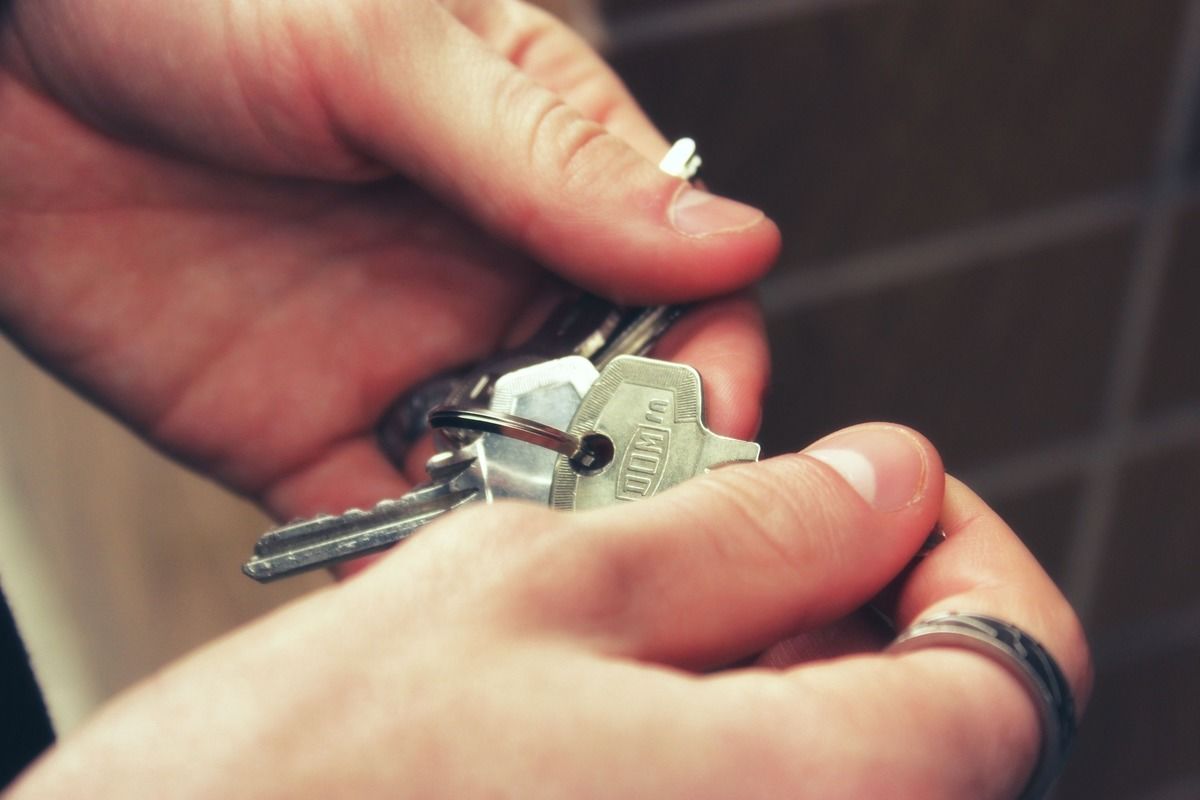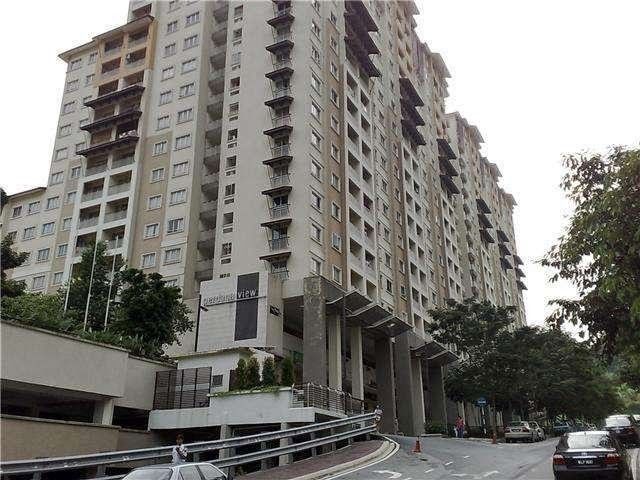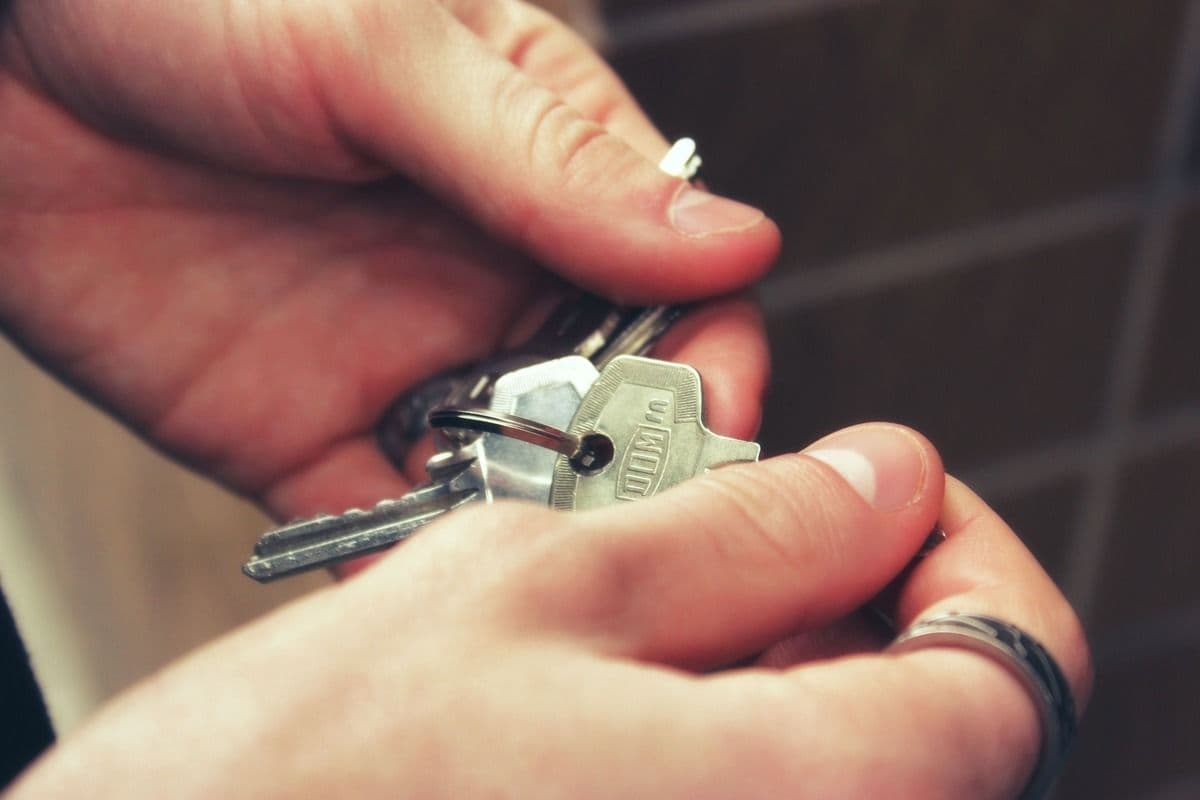
Introduction of Dory
We had the pleasure to interview Dory from Malaysia, who has about 7 years of property investment experience with her husband. In those 7 years, they have invested in 7 properties where 2 has been sold some time ago with about a 50% profit (Gross). She is now living in Japan to pursue her dreams of studying overseas and to continue her studies of the Japanese language. Prior to coming to Japan, she worked in Malaysia for about 7-8 years. In this interview, we only talked about a few of her properties that she currently owns. We conducted an interview with Dory to provide relevant insight to readers.
How long have you been in Japan and where are you currently living?
I have been in Japan for a year and three months. I am now renting a mansion which is located at a place called Kamiochiai, somewhere in Shinjuku prefecture.
How did you find this mansion (condominium)?
 Dory’s current rental mansion
Dory’s current rental mansion
First, I was introduced a realtor through my senpai (senior) from school. I went into the realtor and on the same day, they took me around to two different units and checked the surrounding areas. Although it was difficult to decide on which unit to rent, I decided on the same day. The decision was made because it was closer to Shinjuku, Ikebukuro, and my school. The other unit was located a bit further from those places, about 25 minutes by train to Seibu Shinjuku Station. It is also much more spacious than my previous unit. My current unit is a 1DK and about 23 square meters. Also, even though the apartment is about 30 years old, I guess Japanese people do a good job in maintaining the unit. These are the reasons why I chose my current place.was introduced a realtor through my senpai (senior) from school. I went into the realtor and on the same day, they took me around to two different units and checked the surrounding areas. Although it was difficult to decide on which unit to rent, I decided on the same day. The decision was made because it was closer to Shinjuku, Ikebukuro, and my school. The other unit was located a bit further from those places, about 25 minutes by train to Seibu Shinjuku Station. It is also much more spacious than my previous unit. My current unit is a 1DK and about 23 square meters. Also, even though the apartment is about 30 years old, I guess Japanese people do a good job in maintaining the unit. These are the reasons why I chose my current place.
How long did it take to secure the unit?
It didn’t really take me too long. Everything happened on the same day. The appointment, the proposal of the property units, the property viewings, the decision made and the deposit payment were all on the same day.
Were you able to move into the property after you paid the deposit?
Not really. It really depends. As I know, it usually takes the owner about a month to clean up the whole place and allow the new tenant to move in. This was the case with me as well. I had to wait for about a month. They told me that I can pay the deposit within 3 days, but I thought that I did not want to drag things and since I had made my decision, I just paid the deposit on the same day.
How many properties did the agent introduce to you?
At first, he showed me a dozen units from his database. Then we narrowed down to 2 units.
As a foreigner, did you have any difficulties in renting?
Yes, when I first came to Tokyo to look for a place (the previous mansion), I did not have a residence card nor a bank account. For those who have a residence card and a bank account, it shouldn’t be too difficult for foreigners to rent a place here. In Tokyo, there are more and more realtors that hire foreign staff. Though on the other hand, there are owners who are not keen to rent out to foreigners. They will probably rent their properties out to foreigners if it is an older apartment, like 30 to 50 years old apartments, which Japanese people don’t really fancy.
I had no choice at first, so I had to go through the realtors that only targets students. They help local and foreign students to look for houses even before they graduate. This realtor had a very wide network and properties all around Japan. There is a website which provides complete information and explanation on the timing of application. For example, the new intake is in March and probably the university entry examination is by October or November. By that time, students can already apply to them and go for property viewing, even though they are unsure whether they would be able to enter the university or not. They can pre-book the units and decide once they get their results. For my case, I already knew that I got accepted by my school, but I did not have the residence card so I couldn’t sign a rental contract without it.
I didn’t like the terms and conditions under this realtor. They know we have limited choices, so they impose very high fees and deposit. However, not only do they help students to find a place, they also provide after support to students. For example, if a student gets sick and is helpless, they can contact their call center to seek for guidance and advice. So, I guess because of these added-value services, they imposed a very high fee.
How much did you pay for the upfront costs?
I paid 2-months of rent for the shikikin (key deposit). Besides the shikikin, I also paid for reikin (key money), an amount of money to be shared among the owner and the realtor. I paid 2-month rental for reikin. In total, I paid about 4-months of rent for upfront costs and one-month rental in advance. In Malaysia, we know how much we have to pay to the realtor up front but in Japan, they wouldn’t tell us. One of the reasons why I chose my current unit is because I don’t have to pay for the key money and I would only need to pay one-month rental for the deposit.
Is the high upfront cost because you did not have a residence card and a bank account?
That had nothing to do with the residence card and bank account, it all depends on the owner. I guess one of the benefits of renting an older apartment is that you might not need to pay for the key money and might also able to pay for a lower deposit.
How long did you stay in your previous apartment?
I stayed at the previous apartment for about 9 - 10 months. I did not continue to stay in that apartment because it was too small, it was only 12 square meters. It had a mini kitchen and a very small bathroom with a mini bathtub. Now I have a very spacious room, kitchen, and toilet.
How much was the rent for the previous apartment and the current apartment?
Previously I had to pay about 62,000 yen for both rent and maintenance fee. Now I have to pay a total of about 70,000 yen. The owner will not cover maintenance fee and you even need to buy your own fire insurance. I can opt for the purchase of 1-year fire insurance. The cost of the fire insurance is calculated by the number of people living and the layout of the house. For my case, it’s only one person and 1DK, so they quoted me about 10,000 yen per year.
How about the utilities?
I had to set up the utilities by myself. It only took a couple of hours from the time you started to contact the utility company to get it done. They were efficient. However, for the application of gas, which is probably more complicated and dangerous, so you have to set up a little bit longer with them. If you have a stove of your own, it’s better to ask them to connect the hose for you. The set up was free of charge. For the gas and electricity, it was 3,000 yen on average respectively for a month. For the water, it was about 1,500 yen to 2,000 yen per month. However, these vary according to the season. Then I will also need to pay for the internet fee which I applied by myself and it costs about 4,000 yen per month. In total, I will have to pay around 80,000 yen per month for everything.
How long was the rental period?
I opted for a 2-year rental contract, but I can move out anytime within the 2 years. I only need to give them 1-month notification without paying anything. After 2 years, I guess I can opt for a renewal of contract because it is uncommon for the owner to chase the tenant out in Japan. In order for me to renew the contract, I have to pay 1-month rent for the renewal fee. After you move out, if there is no any major maintenance needed, they will deduct an amount from the deposit as the cleaning fee.
Did you have any experience in renting property in Malaysia? If so, what are the differences in Malaysia and Japan?
Yes, I have experience renting in Malaysia. For me, I only rented a room before, instead of a house. I also have experience renting out my house to both a local and a foreigner before. It is very easy to rent a house to a foreigner in Malaysia. Unlike in Japan, the foreigner only needs to provide a passport. To apply for a residence card in Japan, you need to wait for a long time. That was my issue. It caused me not being able to make a good decision and I had to pay a lot of money to rent the previous unpleasant property at the first place.
However, in Malaysia, we do not need an extra ID card from the foreigner, but only passport. For the bank account, it depends on the background of the tenants. We only did profiling to one of our tenants to know more about him but we did not ask for extra documentation. However, there was another tenant that we even went all the way up to his office. He probably already knew that we were a bit worried so he invited us to his office, showed us his bank statements and told us about his story. Everything was okay and to file the property document, we only needed one document, which was the passport.
Did you go use a realtor to rent out your property?
We went through a realtor and they settled everything for us once the passport was provided, but we did once without going through a realtor and everything was fine. As long as there is a black and white agreement and the tenant agrees to the terms of the agreement, the owner can act as an agent and bring the agreement to the government department to ask for a stamp by paying the stamp duty. In Malaysia, you don’t have to go through any agency but in Japan, I found it to be very strict and the process to be a bit troublesome.
The agent who introduced my current property was Chinese, so we could communicate very well and he had a lot of experiences in dealing with foreign students. Before that, I went to another agency by myself and talked to a Japanese agent. That agent probably had not much experience in dealing with foreign students, so I had been asked a lot of questions as well. I understand that as a foreigner, the owner will have some concerns. It was exactly as same as me, renting a unit to a foreigner in Malaysia.
How did you pay and receive the rent in Japan and Malaysia respectively?
I am using a direct debit to pay my rental to the agency in Japan. This is because the owner of my current unit engages the property agency as the management company. In Malaysia, they will pay to our bank account.
Is there any difference between the rental contract in Malaysia and in Japan?
In Malaysia, there are more terms in the rental contract. In Japan, they are already very strict in the starting and require you to do auto debit, so I guess therefore there are lesser terms in comparison. Moreover, I found that the terms in the Japanese rental contract are straightforward. Japan, everything is pro owner and protects the owner very well. In the terms and conditions, they pre-stated that no matter how well you maintain the unit, they will still deduct a certain amount of money from your deposit. In my previous apartment, I maintained the room quite well but they still deducted 32,000 yen from my deposit (about 25% of the deposit) as a cleaning fee. This was written in the rental contract. I guess this is the reason why they don’t have to put in very detailed terms. As I know, even the law itself in Malaysia protects the tenant. I found that the rental terms and conditions are pro tenant in Malaysia, but pro owner in Japan.
How much are the upfront costs in Malaysia?
The upfront costs are more or less the same, but there is no key money. Deposit is usually 1 or 2-month of rent. In addition, the tenant has to pay 1-month rent in advance and utility deposit. In Japan, there is no utility deposit. We can deduct an amount of money from the utility deposit just in case there are outstanding bills, which happens quite often.
How long is the rental period in Malaysia?
Normally in Malaysia, the rental period is a fixed 1-year period and you have the option to renew for another year. There is no renewal cost in Malaysia. If they want to move out within the rental period, 2-month notice period is required, which depends on how many months deposit did they pay. In Japan, the owner will only pay back the deposit after the tenant has moved out. However, in Malaysia the owner will take the deposit (2-month rental) to cover the rental after the tenant has given a 2-month notice period to move out. For example, if the tenant notifies the owner in September that he plans to move out in December, they don’t need to pay rental anymore because the deposit is used to cover. If there is any damage, they would not be able to use the deposit to cover the maintenance and cleaning fee. You have to think of some ways to protect ourselves but it is not easy. If we ask for more deposit, they might just walk away to look for other rental units.
Do you have any advice for foreigners who would like to rent property in Japan?
First, you need to choose the right location. Then, you need to choose the right timing. Don’t choose to move into a new rental place during the peak season like March or April. By then, the moving fees is going to be very expensive and the chance for you to get a good unit with affordable price might be lower. If possible, try to get a unit which is above the first floor. This is because the first floor might be quite humid and most probably cockroach will be hiding in your unit. But of course, it is quite convenient if you stay at a place where it does not have an elevator.

Why made you invest in real estate?
At first, I was thinking to have at least one property in my whole lifetime because it’s better to have assets. I was only thinking of owning my own dream house but after that for some reasons, my husband was influenced. In the starting, he didn’t believe in investing in property but my father-in-law and my husband’s friend have been actively investing in property. Under these influences and at the same time, I urged him to have some properties on hand so we got our first one. After that, he started to study the trends and found out a few properties which are undervalued, and he thought they were good bargains. Moreover, we will also look at the catalysts such as the latest news regarding the development of the area where the property is located. This will help to increase the property price of the area. Also, it depends on the timing.
When did you purchase your first property?
I purchased my first investment property 8 years ago together with my brother. It’s located in Damansara Perdana, which is very near to IKEA and One Utama. After we bought the property, they started to build Empire Damansara and MRT. Although, it was still affordable in terms of buying or renting because it is not a very high-end property. The location is the most important thing for the rental market property.
During that time, we couldn’t tell for sure how much we would be able to earn for that property. To note, when my husband & I consider property investment, we would categorize them into 2 categories, property which is better for rental market and property which is better for flipping.

Dory’s first property in Damansara Perdana
Do you have any target tenant?
I have thought about it. If possible, I prefer working adults or family.
Other than location, are there any important factors that you consider?
The location is not the only thing, pricing is important as well. Pricing is very technical and complicated. Actually, the main person who did a lot of analysis was my husband. So, what I am sharing now is what I learned from him. At first, you have to do price research by comparing the prices among the surrounding areas. You have to check the pricing, the costs, and rental market, the selling price and the price per square feet in these surrounding areas. Furthermore, you have to check the background of the property area to see if there is any future development, which can influence the area.
Where did you find all this information?
You only need to go through the internet and look into the real estate portal site to do the price research. For research on the future development of the area, is more tricky. You have to read a lot and remember what you have read. Or else, you need to go out to meet people and talk to them. My husband has a couple of contacts of the property developers and he talked to them. You will definitely need some relevant insights from these kinds of experts. They are also like us looking for cheap places and lands. We have to think like them when we buy property regarding the location and price. This is macro research where we look at a bigger picture. Then we will proceed to the smaller details like the exact location, accessibility and surrounding facilities which can help you to rent the property out fast. This involves a lot of time and thinking. Sometimes you cannot wait for so long because you are also afraid that the price of the property will increase. It also depends on your own luck.
How did you find your first property?
I got to know about that property in Damansara Perdana through my husband. One of my ex-colleagues was also staying there but he stayed in a bigger unit, so I went there before and was kind of like it. Someone put it on an advertisement and my husband came across it. That time my husband had been actively searching for property. Before I bought the unit at Damansara Perdana, he bought one apartment located in Surian Damansara, which is just walking distance to The Curve & IKEA. But he had sold off this unit after holding it for 3-4 years.

Dory’s husband’s property in Mont Kiara
A couple of years later, my husband saw one posting for another apartment which is located at Mont Kiara. It was fully furnished, fully renovated, free hold apartment located in a quiet neighborhood at Mont Kiara. The facilities are top notch where it also comes with a few sky lounges built with different themes. During that time, my husband thought it was a good deal. He saw the potential of decent capital gain as new blocks are being built to this same apartment but with a selling price of a few times higher than our targeting unit during that time, in terms of per square feet. Hence, we bought it.
How long did you take from finding a property to settlement?
I can’t really say how long it took to find the property because it really depends. I asked some of my friends as well but nobody had an answer. What I can share is starting from the day that I approached the property agent. Usually, we will do some negotiation on the pricing and it takes about 1 or 2 weeks to get the response. Then we will apply for the mortgage loan, which takes about 1 week. At the same time, the agent will draft up a confirmation agreement where both parties will have to look at the agreement first before we sign, which will take another 1 or 2 weeks. It only involves one or 2 pieces of papers. At this stage, we have to pay 3% of the total 10% deposit. We can include a clause stating that if the buyer is not able to secure a loan, then the owner will have to pay back the deposit.
After we get a confirmation on the mortgage loan, we will negotiate with a lawyer. Normally the buyers will engage their own lawyer instead of using the owner’s lawyer. This is for the buyers to protect themselves. The lawyer is responsible for preparing the sales and purchase agreement (S&P agreement). He has to do a lot of paper work and research. Before the owner hands over the property, the lawyer will check if there are any outstanding utility bills or maintenance needed. He will also need to do the title transfer, etc. There will be a clause saying that from the day we send the S&P agreement, the owner has to pass us the key within 90 days. Once we receive the key, we have to pay him in full. This is the estimation for freehold property, leasehold property will take even longer.
Did you face any difficulties in buying the property in Malaysia?
Everything was quite smooth and steady for my first purchase, but my owner was very busy that time. She delayed the key handover and she had to pay penalty. For my property purchase experience, it is so far so good. It’s even less hassle if you buy the property from developers.
However, my first apartment bought is with strata title and the strata title is still under my previous owner’s name. This should be the developer’s fault. I might have difficulties if I want to use the property for refinancing. These couple of years, our property management team tried to fight for the strata title on behalf of us by giving pressure to the developer, but we haven’t received the title yet. Finding a property with a good developer is also very important. When you are finding a property, you need to consider the background of the property developer as well.
Did you have to pay commission and were there any other costs involved?
For sub sale, yes. The 3% of deposit that I paid is for the agent but is paid by the owner to the agent as a selling cost (commission to the agent). There were many costs involved such as stamp duty, lawyer fees, etc. They had to be in cash. I needed to prepare about 20% to 30% of the property price in cash. 10% of the property price was for deposit. On top of that, you need to pay other costs such as the lawyer fees, which you have to pay for both mortgage loan agreement and S&P agreement.
DISCLAIMER: The views and opinions expressed in this article do not necessarily reflect the views of BEYOND BORDERS CO., LTD.
If you have any questions or would like to arrange a viewing, please feel free to contact us!







